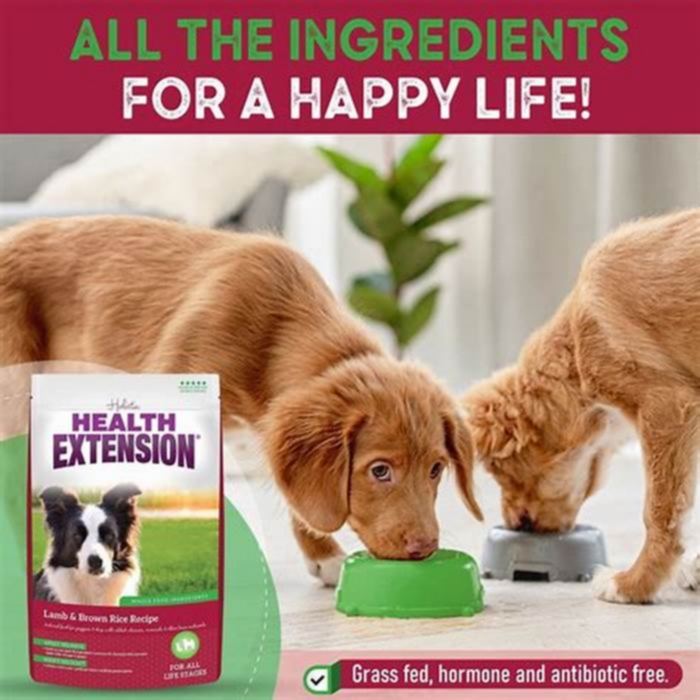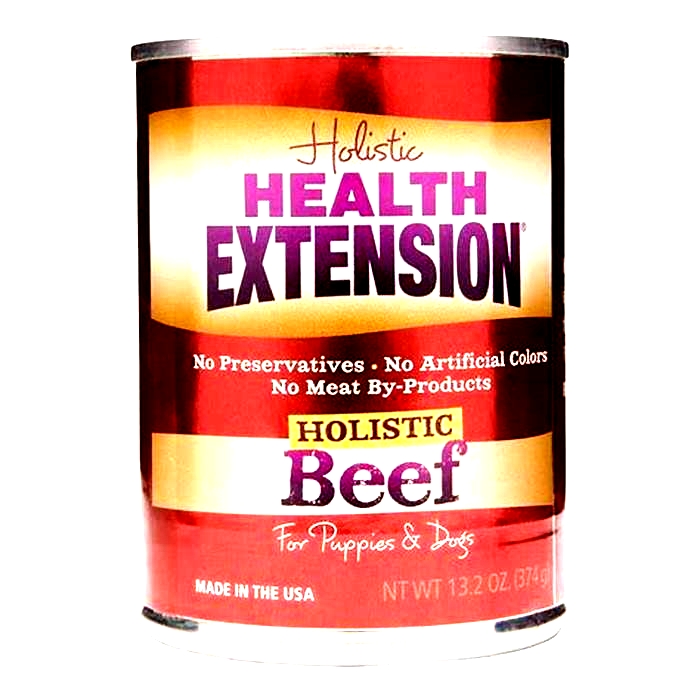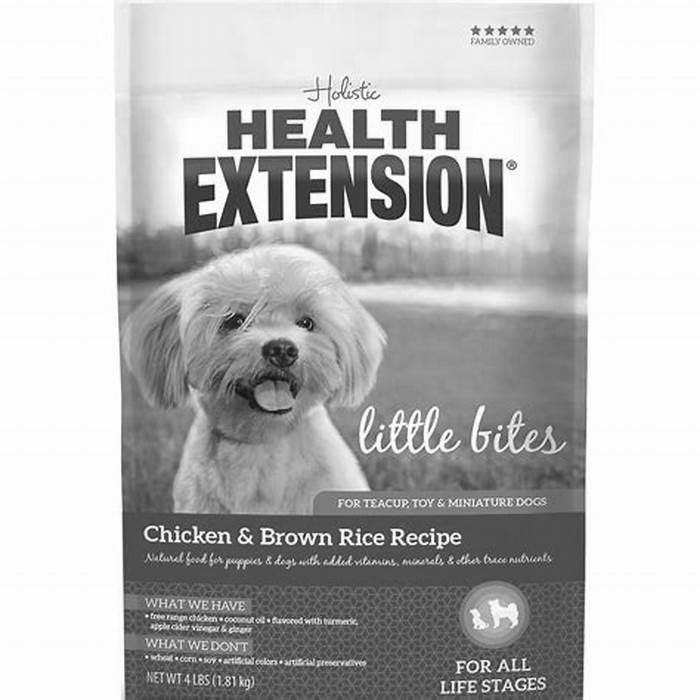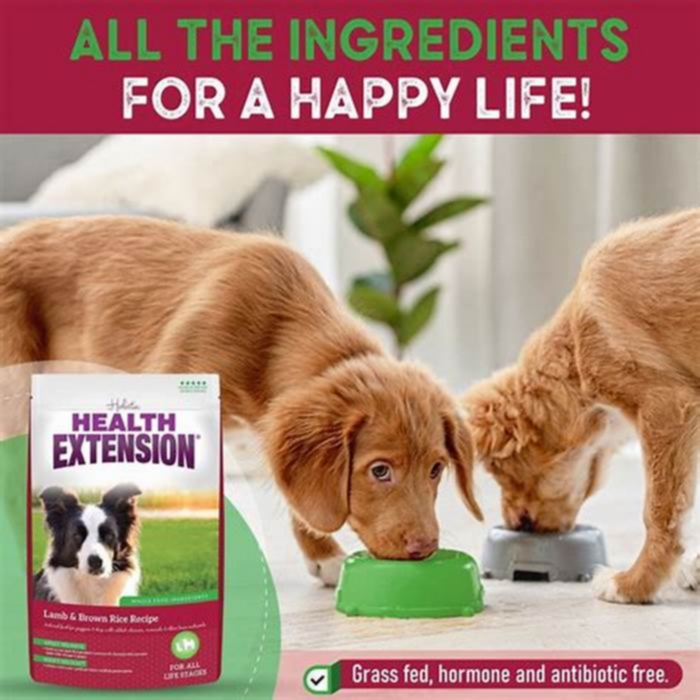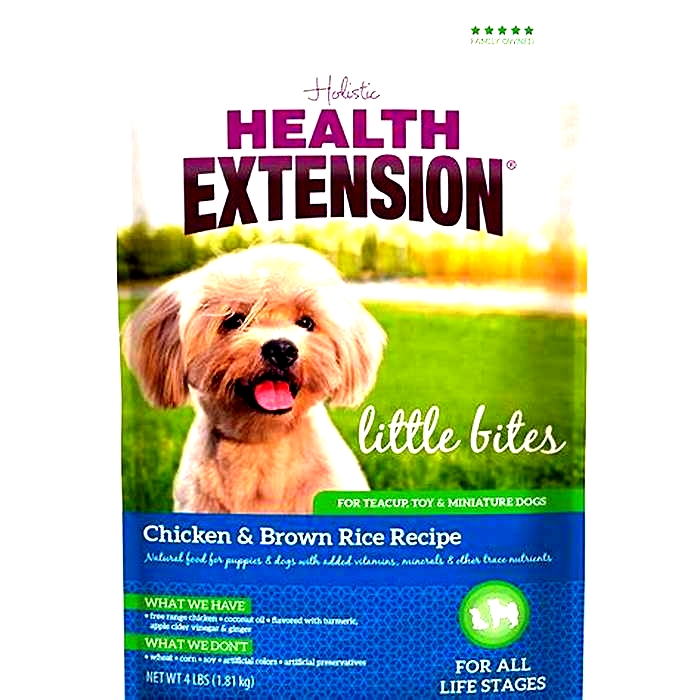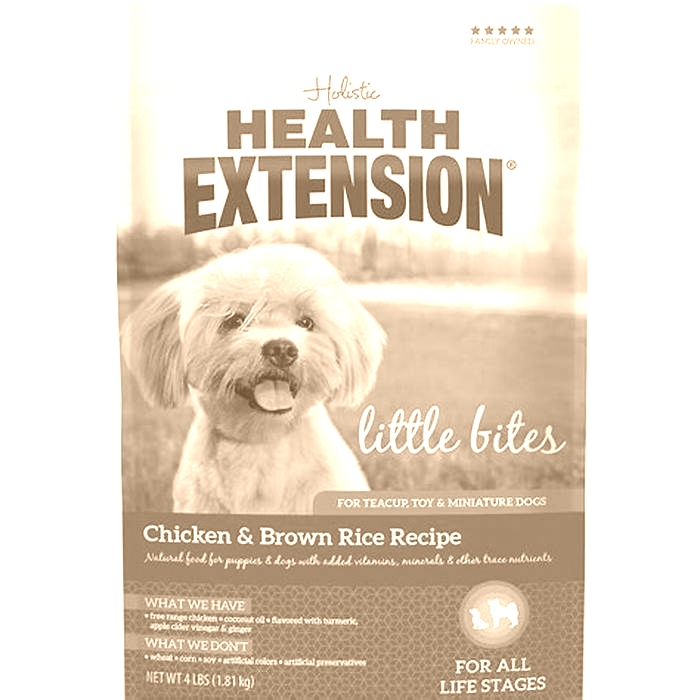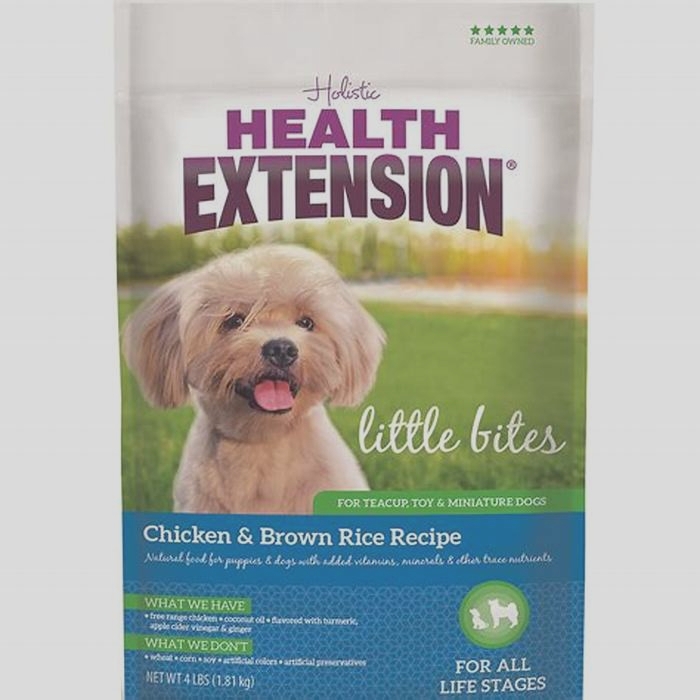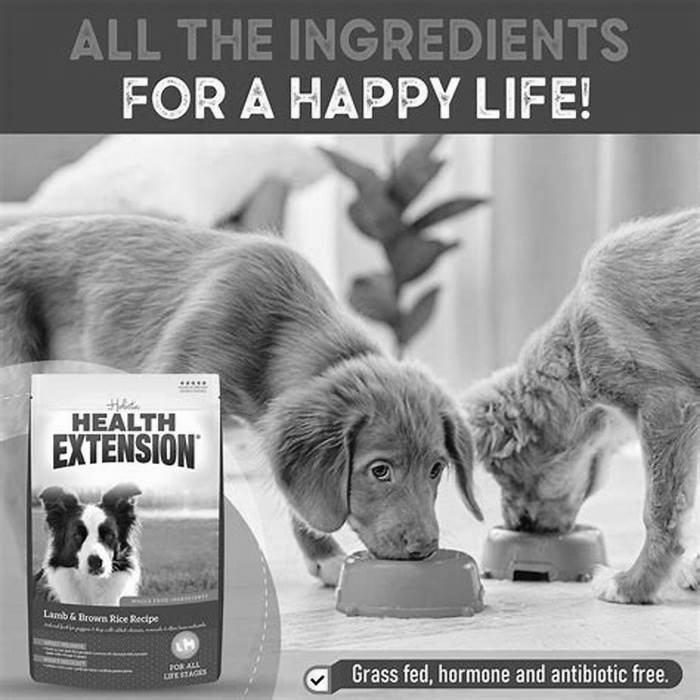health extension dog food wet
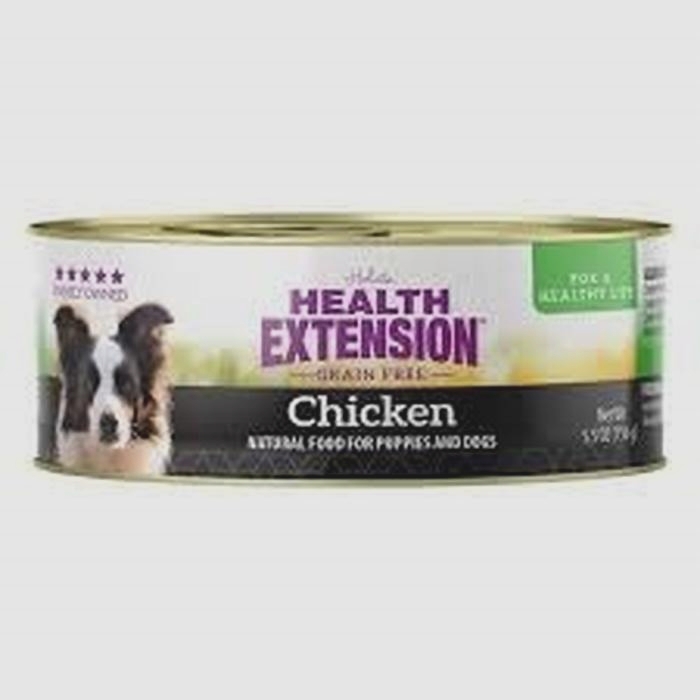
Health Extension Dog Food Review (Canned)
Health Extension Dog Food Review (Canned)
By Mike Sagman
Updated: March 22, 2024
DogFoodAdvisor is reader supported See how
All reviews are 100% impartial but if you buy using links on this page, we may earn a referral fee.
Which Health Extension Recipes Get Our Best Ratings?
Health Extension canned dog food receives the Advisors second-highest tier rating of 4 stars.
The Health Extension product line includes the 9canned dog foods listed below.
Each recipe below includes its AAFCO nutrient profile when available Growth (puppy), Maintenance (adult), All Life Stages, Supplemental or Unspecified.
Recipe and Label Analysis
Health Extension Grain Free Turkey Entree was selected to represent the other products in the line for detailed recipe and nutrient analysis.
Label and nutrient data below are calculated using dry matter basis.
Health Extension Grain Free Turkey Entree
Estimated Dry Matter Nutrient Content
Turkey, chicken, chicken broth, sweet potatoes, carrots, blueberries, cranberries, guar gum, potassium chloride, minerals (zinc proteinate, iron proteinate, copper proteinate, manganese proteinate, sodium selenite, cobalt proteinate, potassium iodide), agar-agar, natural flavor, choline chloride, vitamins (vitamin E supplement, thiamine mononitrate, niacin supplement, d-calcium pantothenate, vitamin A supplement, riboflavin supplement, biotin, vitamin B12 supplement, pyridoxine hydrochloride, vitamin D3 supplement, folic acid), sodium carbonate
Fiber (estimated dry matter content) = 1.5%
Red denotes any controversial items
| Guaranteed Analysis | 9% | 9% | NA |
| Dry Matter Basis | 10% | 9% | 73% |
| Calorie Weighted Basis | 9% | 21% | 69% |
Ingredient Analysis
The first ingredient in this dog food is turkey. Turkey is considered the clean combination of flesh and skin derived from the parts or whole carcasses of turkey.1
Turkey is naturally rich in the ten essential amino acids required by a dog to sustain life.
The second ingredient is chicken, another quality addition.
The third ingredient is chicken broth. Broths are of only modest nutritional value. Yet because they add both flavor and moisture to a dog food, they are a common component in many canned products.
The fourth ingredient includes sweet potatoes, which are a gluten-free source of complex carbohydrates in dog food. They are naturally rich in dietary fiber and beta carotene.
The fifth ingredient lists carrots. Carrots are rich in beta-carotene, minerals and dietary fiber.
The sixth ingredient includes blueberries. Blueberries are a good source of vitamins, minerals and dietary fiber.
The seventh ingredient lists cranberries, a nutrient-rich fruit thats also high in fiber.
The next item is guar gum, a gelling or thickening agent found in many wet pet foods. Refined from dehusked guar beans, guar gum can add a notable amount of dietary fiber to any product.
From here, the list goes on to include a number of other items.
But to be realistic, ingredients located this far down the list (other than nutritional supplements) are not likely to affect the overall rating of this Health Extension product.
With 2 notable exceptions
First, this food includes chelated minerals, minerals that have been chemically attached to protein. This makes them easier to absorb. Chelated minerals are usually found in better dog foods.
And lastly, this recipe contains sodium selenite, a controversial form of the mineral selenium. Sodium selenite appears to be nutritionally inferior to the more natural source of selenium found in selenium yeast.
Nutrient Analysis
Based on its ingredients alone, Health Extension canned dog food looks like an above-average wet product.
The dashboard displays a dry matter protein reading of 41%, a fat level of 39% and estimated carbohydrates of about 13%.
As a group, the brand features an average protein content of 41% and a mean fat level of 29%. Together, these figures suggest a carbohydrate content of 21% for the overall product line.
And a fat-to-protein ratio of about 70%.
Which means this Health Extension product line contains..
Near-average protein. Above-average fat. And below-average carbs when compared to a typical wet dog food.
Free of any plant-based protein boosters, this looks like the profile of a wet product containing a notable amount of meat, except for the Vegetarian recipe.
However, with 21% of the total calories in our example coming from fat versus just 9% from protein, some recipes may not be suitable for a dog on a low fat diet.
Our Rating of Health Extension Canned Dog Food
Health Extension lists both grain-inclusive and grain-free canned dog foods using a notable amount of named meats as its dominant source of animal protein, thus earning the brand 4 stars.
Highly recommended.
Related Topics
Readers interested in Health Extension wet dog food may also wish to check out these popular pages, too
Health Extension Dog Food Recall History
The following automated list (if present) includes all dog food recalls related to Health Extension through April.
No recalls noted.
You can view a complete list of all dog food recalls since 2009 here.
Get Free Recall Alerts
Get free dog food recall alerts sent to you by email. Subscribe to The Advisors recall notification list.
More Health Extension Brand Reviews
The following Health Extension dog food reviews are also posted on this website:
Compare This Dog Food
How does this brand compare with The Dog Food Advisor's most recommended brands?
A Final Word
The Dog Food Advisor does not accept money, gifts, samples or other incentives in exchange for special consideration in preparing our reviews.
However, we do receive a referral fee from online retailers (like Chewy or Amazon) and from sellers of perishable pet food when readers click over to their websites from ours. This helps cover the cost of operation of our free blog. Thanks for your support.
For more information, please visit our Disclaimer and Disclosure page.
Health Extension vs. Hill's Science Diet

Health Extension vs. Hill's Science Diet
In this comparison article for Health Extension vs Hill's Science Diet, we'll highlight the key differences between these two pet food brands. To properly compare Health Extension and Hill's Science Diet, we'll use up-to-date nutritional and price information.
There are many factors to consider when choosing the best pet food brand for your pet. Factors such as ingredient quality, guaranteed analysis, product safety, brand history, and cost are among the most important factors to consider.
Throughout this Hill's Science Diet vs Health Extension comparison, we've utilized average data to make general comparisons. If you'd like to see individual product reviews, visit our Health Extension Review Page or Hill's Science Diet Review Page.
Guaranteed Analysis: Hill's Science Diet vs. Health Extension
According to AAFCO, all pet food labels must provide a guaranteed analysis of nutrient content. The analysis must provide guaranteed minimum percentages of crude protein and crude fat, and maximum percentages of crude fiber and moisture.
All percentages used in this comparison are averages reported on a dry matter basis.
Health Extension Dog Food vs. Hill's Science Diet Dog Food
| Dry Dog Food | Health Extension | Hill's Science Diet |
| Crude Protein | 27.6% | 24.6% |
| Crude Fat | 16.5% | 14.7% |
| Crude Fiber | 5.1% | 3.7% |
| Wet/Canned Dog Food | Health Extension | Hill's Science Diet |
| Crude Protein | 40.2% | 25.7% |
| Crude Fat | 28.0% | 17.3% |
| Crude Fiber | 6.7% | 3.5% |
Crude Protein Comparison For Dog Food
Dogs require twenty-two amino acids to sustain life. Twelve of these amino acids are synthesized naturally, the remaining ten are consumed. Protein is the nutrient which provides some or all of these ten essential amino acids.
There is a small difference between the protein content of Health Extension and Hill's Science Diet. We can see that Health Extension guarantees about 3.07% more protein than Hill's Science Diet. In addition, Health Extension wet dog foods also provide more protein than Hill's Science Diet wet foods.
Crude Fat Comparison For Dog Food
Fats are an absolutely vital component of a balanced canine diet. Not only do fats provide energy, but they also serve important roles in the normal development and function of your dog's body. For example, fats help dogs produce prostaglandins, which reduce inflammation among many other significant functions.
There is a relatively insignificant difference between the crude fat content of the two brands. For wet dog foods, Health Extension provides significantly more fat (about 10.73% more).
Both brands provide roughly the same amount of crude fiber. For wet dog foods, Health Extension typically provides a little more fiber (about 3.21% more).
Health Extension Cat Food vs. Hill's Science Diet Cat Food
| Dry Cat Food | Health Extension | Hill's Science Diet |
| Crude Protein | 38.6% | 35.0% |
| Crude Fat | 18.3% | 18.5% |
| Crude Fiber | 6.7% | 4.5% |
| Wet/Canned Cat Food | Health Extension | Hill's Science Diet |
| Crude Protein | 54.6% | 38.7% |
| Crude Fat | 20.3% | 21.5% |
| Crude Fiber | 6.3% | 3.6% |
Crude Protein Comparison For Cat Food
Cats require twenty-two amino acids to sustain life. Eleven of these amino acids are synthesized naturally, the remaining eleven are consumed. Protein is the nutrient which provides some or all of these eleven essential amino acids.
According to our average data, Hill's Science Diet typically provides less protein than Health Extension. However, this difference is relatively small and doesn't represent a significant difference between the two brands. In addition, Health Extension wet cat foods also provide more protein than Hill's Science Diet wet foods.
Crude Fat Comparison For Cat Food
There are many ways in which dietary fat contributes to the overall health of our feline friends. Here is a short list of benefits provided by fats (not exhaustive):
- Fats help with the digestion and absorption of fat-soluble vitamins
- Reduce inflammation associated with arthritis
- Slow the growth of yeast infections
- Prevent or reduce the likelihood of certain heart problems.
- Aid in the development of the retina and visual cortex.
As you can see, Health Extension and Hill's Science Diet guarantee a similar amount of crude fat. With regards to wet cat food, Hill's Science Diet and Health Extension also provide roughly the same amount of crude fat.
If you look at the average percentages of crude fiber, you'll notice that Health Extension typically guarantees 2.16% more fiber. This is a fairly small difference between Health Extension and Hill's Science Diet, but still worth mentioning. In addition, Health Extension wet cat foods also provide more fiber than Hill's Science Diet wet foods.
Health Extension Pet Food Ingredients vs. Hill's Science Diet Pet Food Ingredients
Health Extension and Hill's Science Diet both use the following controversial ingredients in many of their products:
LiverLiver is a controversial ingredient because the source animal is not specified. Anonymous animal ingredients are typically very low quality and may contain almost any animal, including dogs and cats!
Pea ProteinPea protein is produced by removing the starchy parts of peas. Pea protein is considered controversial because it provides a substantial plant based protein boost. This boost is undesirable because plant based protein is typically lower in biological value when compared to meat based proteins.
Tomato PomaceTomato pomace is a by-product of tomato manufacturing. It's considered a controversial ingredient because many people believe it is an inexpensive low quality filler. However, tomato pomace provides a notable amount of dietary fiber, B vitamins, Lycopene, and vitamin A. Although it is a very inexpensive ingredient, it is not nutritionally empty.
Here are some of the controversial ingredients used only by Health Extension.
GarlicGarlic in very small quantities can be an acceptable addition, however, garlic can also be toxic. Therefore many pet owners choose to completely avoid garlic.
Beet PulpBeet pulp is the by-product which remains once sugar has been extracted from sugar beets. The primary contribution of beet pulp is dietary fiber.
We'd also like to note that beet pulp is fairly controversial in pet food. Proponents claim that beet pulp can promote intestinal health and regulate blood sugar. However, opponents claim that beet pulp is an inexpensive filler.
Canola OilCanola oil is a plant-derived oil from the seeds of canola plants. Although fat is an essential component of any diet, canola oil is controversial in pet food. Proponents claim that canola oil provides a better fat profile in comparison to other plant based oils. However, opponents claim that canola oil is typically produced with genetically modified rapeseed and that rapeseed oil has multiple adverse health affects.
Buffered GarlicGarlic in very small quantities can be an acceptable addition, however, garlic can also be toxic. Therefore many pet owners choose to completely avoid garlic.
Here are some of the controversial ingredients used only by Hill's Science Diet.
CaramelCaramel is a widely used natural food colorant. The concentrated form of caramel is typically listed as caramel color and has been linked to cancer in laboratory animals. Since our pets do not care about food color, caramel is an unnecessary addition with possible health risks.
Corn FlourCorn flour a ground cereal grain which provides a modest amount of vitamins, minerals, and plant based protein. It also happens to be one of the most controversial ingredients in pet food.
Proponents of corn claim that corn is highly digestible and an excellent source of protein, energy, vitamins, minerals, and essential fatty acids.
Opponents however believe that positive claims in regards to corn are either half-truths or completely false, we'll discuss a few of the opposing arguments.
In regards to digestibility, the claims of "highly digestible" are only true if corn is processed into a meal or flour and subsequently cooked. In regards to the protein contribution, we must note that corn is a plant based protein which does not contain all of the necessary amino acids required by pets to sustain life. Therefore substituting corn for meat is an unsuitable substitution and actually degrades the overall protein quality of the product.
Finally, we'll discuss the claims about vitamins and minerals in corn. Although corn does provide many vitamins and minerals, it not necessarily an exceptional ingredient in this regards. There are many other ingredients which are more complete and biologically appropriate. Therefore the usage of corn as the primary ingredient in pet food should certainly warrant further questioning.
Iron OxideIron oxide is an FDA approved natural food coloring agent. It's commonly found in rusting metal and provides a reddish-brown color.
We believe food colorants are unnecessary ingredients in pet food. Other than potential harm, food colorants do not provide any nutritional value. These type of ingredients are used only to make the food look appealing to humans.
Pork PlasmaPork plasma is the colorless fluid part of a pig's blood. It may sound disgusting, but it's actually very nutritious for pets. Regardless of the nutritional aspects, consumers are shocked by this ingredient, which is why pork plasma is considered a controversial ingredient.
Poultry FatPoultry fat is a by-product of poultry tissue rendering. Poultry fat is a controversial ingredient because the specific protein is not specified. Such ingredients are typically low-quality in comparison to named poultry fats (e.g. chicken fat, turkey fat).
Animal LiverAnimal liver is a controversial ingredient because the source animal is not specified. Anonymous animal ingredients are typically very low quality and may contain almost any animal, including dogs and cats!
Brewers RiceBrewer's rice is the small fragments of rice kernel that are separated from the larger kernels of milled rice. The fragments do not contain the same nutrition profile of the whole kernel and therefore brewer's rice is a lower quality grain. Brewer's rice is typically regarded as an inexpensive and low quality filler.
Wheat GlutenWheat gluten is the main protein of wheat. Although wheat gluten is mostly protein, wheat gluten is considered controversial because it significantly boosts the protein content of the product. This is undesirable because plant based protein does not provide the same amino acid profile as meat based protein.
Caramel ColorCaramel color is a concentrated form of caramel, a natural food colorant. Caramel color has been linked to cancer in laboratory animals. Since our pets do not care about food color, caramel color is an unnecessary addition with possible health risks.
Beef By-ProductsBy-products are defined by AAFCO as the "non-rendered, clean parts, other than meat, derived from slaughtered mammals." Thus, beef by-products contain nearly all parts of the beef which are typically not consumed by humans. These parts include the liver, lung, spleen, kidney, stomach, blood, intestine, bone, etc.
Like other meat by-products, beef by-products are considered controversial, mainly because they are inexpensive ingredients which consumers have equated with slaughterhouse waste. However, manufactures and many experts claim that animal by-products are unjustly criticized. Proponents state that "named" by-products, such as beef by-products, supply many important nutrients required by pets.
Corn Gluten MealCorn gluten meal is a by-product from the production of various corn products (corn starch, corn syrup, etc). It's very high in protein (nearly 60% protein) and therefore can significant boost the protein content of the product. Because plant based proteins such as corn gluten meal are inferior to meat based proteins (lack many essential amino acids), they are not suitable substitutes.
Pork By-ProductsBy-products are defined by AAFCO as the "non-rendered, clean parts, other than meat, derived from slaughtered mammals." Thus, pork by-products contain nearly all parts of pork which are typically not consumed by humans. These parts include the liver, lung, spleen, kidney, stomach, blood, intestine, bone, etc.
Like other meat by-products, pork by-products are considered controversial, mainly because they are inexpensive ingredients which consumers have equated with slaughterhouse waste. However, manufactures and many experts claim that animal by-products are unjustly criticized. Proponents state that "named" by-products, such as pork by-products, supply many important nutrients required by pets.
Whole Grain CornWhole grain corn is the entire corn kernel (the germ, bran, and endosperm). Corn is a cereal grain which provides a modest amount of vitamins, minerals, and plant based protein. It also happens to be one of the most controversial ingredients in pet food.
Proponents of corn claim that corn is highly digestible and an excellent source of protein, energy, vitamins, minerals, and essential fatty acids.
Opponents however believe that positive claims in regards to corn are either half-truths or completely false, we'll discuss a few of the opposing arguments.
In regards to digestibility, the claims of "highly digestible" are only true if corn is processed into a meal or flour and subsequently cooked. In regards to the protein contribution, we must note that corn is a plant based protein which does not contain all of the necessary amino acids required by pets to sustain life. Therefore substituting corn for meat is an unsuitable substitution and actually degrades the overall protein quality of the product.
Finally, we'll discuss the claims about vitamins and minerals in corn. Although corn does provide many vitamins and minerals, it not necessarily an exceptional ingredient in this regards. There are many other ingredients which are more complete and biologically appropriate. Therefore the usage of corn as the primary ingredient in pet food should certainly warrant further questioning.
Whole Grain WheatWhole grain wheat contains the entire grain of wheat (the germ, bran, and endosperm). Wheat is the second most-produced cereal grain in the world (corn is the first). Although wheat is a controversial ingredient, it is not necessarily undesirable because it provides dietary fiber and many other nutrients. However, wheat contains a notable amount of plant based protein, which is inferior to meat based protein and therefore an undesirable substitution.
Wheat is also one of the most common ingredients to cause food allergies or intolerance. However, grains such as wheat are typically low offenders in comparison to certain protein sources (such as beef).
Powdered CellulosePowdered cellulose is produced from minuscule pieces of wood pulp and plant fibers. Other than its fiber content, powdered cellulose lacks any nutritional contribution.
Dried Tomato PomaceDried tomato pomace is a by-product of tomato manufacturing. It's considered a controversial ingredient because many people believe it is an inexpensive low quality filler. However, tomato pomace provides a notable amount of dietary fiber, B vitamins, Lycopene, and vitamin A. Although it is a very inexpensive ingredient, it is not nutritionally empty.
Pea Protein ConcentratePea protein concentrate is produced by removing the starchy parts of peas. Pea protein concentrate is considered controversial because it provides a substantial plant based protein boost. This boost is undesirable because plant based protein is typically lower in biological value when compared to meat based proteins.
Soybean Protein IsolateSoy protein isolate is a highly refined/purified form of soy bean protein. Roughly 90% of soy protein isolate is protein. The inclusion of non-meat protein typically degrades the overall quality of protein in the recipe. This degradation is due to the inferior amino acid profile of plant based proteins.
We believe that certain pet food ingredients are linked to adverse health affects; these ingredients are classified as harmful.
Health Extension and Hill's Science Diet both use the following harmful ingredients in many of their products:
Menadione Sodium Bisulfite ComplexMenadione sodium bisulfite complex is a synthetic version of vitamin K that has been linked to many health concerns. Research has suggested possible toxic reactions in liver cells and red blood cells among other serious problems. In fact, one large chemical supplier warns, "The substance is toxic to kidneys, lungs, liver, mucous membranes. Repeated or prolonged exposure to the substance can produce target organs damage."
Here are some of the harmful ingredients used only by Health Extension.
Added ColorThe ingredient "added color" is ambiguous and may include various artificial dyes. Most artificial dyes have been linked to various chronic diseases.
Product Safety: Recall History of Health Extension & Hill's Science Diet?
According to our records, Health Extension has never been recalled.
Hill's Science Diet has been recalled 2 times.
- Jan. 31, 2019: elevated levels of Vitamin D
- March 20, 2019: elevated levels of Vitamin D
Price Comparison: Which Brand Is More Expensive?
| Dry Dog Food | Health Extension | Hill's Science Diet |
| Per Pound | $2.99 | $2.83 |
| Per Calorie | $0.0018 | $0.0018 |
| Dry Cat Food | Health Extension | Hill's Science Diet |
| Per Pound | $2.74 | $4.17 |
| Per Calorie | $0.0016 | $0.0024 |
| Wet Dog Food | Health Extension | Hill's Science Diet |
| Per Pound | $3.61 | $5.03 |
| Per Calorie | $0.0084 | $0.0125 |
| Wet Cat Food | Health Extension | Hill's Science Diet |
| Per Pound | $6.66 | $9.11 |
| Per Calorie | $0.0138 | $0.0197 |
The average cost-per-lb is heavily influenced by the varying amounts of moisture present in each brand's food products (wet vs. dry food, dry vs. freeze-dried food, etc). However, the average cost-per-kcal eliminates the influence of moisture. Therefore, the average cost-per-kcal is the better metric to consider.
If you'd like to calculate the average cost-per-day or cost-pet-year of feeding Health Extension or Hill's Science Diet, input your pet's weight into our cost analyzer widget.
Averages price data can identify whether or not there exists a significant price difference between two brands. However, the actual price that you'll pay for Health Extension or Hill's Science Diet will depend on your shopping habits.
Pet owners who use our price comparison feature typically save more than 25% off retail prices for Health Extension and Hill's Science Diet. In addition, we currently have some great coupons for our readers.
Disclosure: PawDiet has an affiliate relationship with stores featured (or linked-to) in this article. We are compensated for referring customers. Thank you for shopping with our retail partners!
Where To Buy Health Extension Pet Foods
You can purchase Health Extension pet foods from the following stores:
44 Recipes In-Stock Today
38 Recipes In-Stock Today
3 Recipes In-Stock Today
Where To Buy Hill's Science Diet Pet Foods
You can purchase Hill's Science Diet pet food products from these retailers:
125 Recipes In-Stock Today
123 Recipes In-Stock Today
100 Recipes In-Stock Today
Type Of Pet Foods Available
| Product | Health Extension | Hill's Science Diet |
| Dry Dog Food | 15 Recipes | 48 Recipes |
| Wet Dog Food | 15 Recipes | 34 Recipes |
| Dog Treats | 19 Treats | 18 Treats |
| Dry Cat Food | 2 Recipes | 25 Recipes |
| Wet Cat Food | 13 Recipes | 48 Recipes |
| Cat Treats | 2 Treats | None |
Top Rated Health Extension Recipes
Dog Food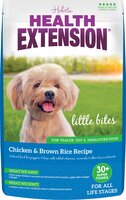
Health ExtensionLittle Bites Chicken & Brown Rice Recipe For Dogs
Check PriceDog Food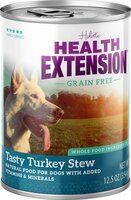
Health ExtensionGrain Free Canned Dog Food Tasty Turkey Stew
Check PriceCat Food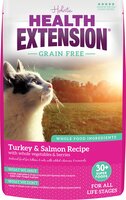
Health ExtensionGrain Free Dry Cat Food Turkey & Salmon Recipe With Whole Vegetables & Berries
Check PriceCat Food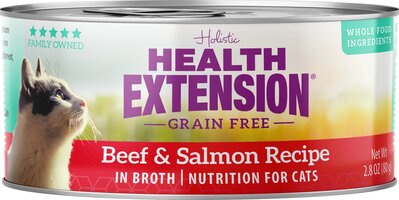
Health ExtensionGrain Free Canned Cat Food Beef & Salmon Recipe In Broth
Check PriceTop Rated Hill's Science Diet Recipes
Dog Food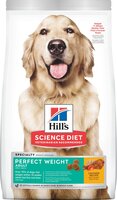
Hill's Science DietPerfect Weight Adult Chicken Recipe For Dogs
Check PriceDog Food
Hill's Science DietAdult Sensitive Stomach & Skin Salmon & Vegetable Entree
Check PriceCat Food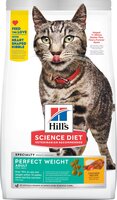
Hill's Science DietPerfect Weight Adult Chicken Recipe
Check PriceCat Food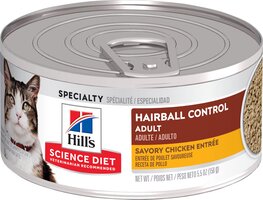
Hill's Science DietAdult Hairball Control Savory Chicken Entree
Check Price
